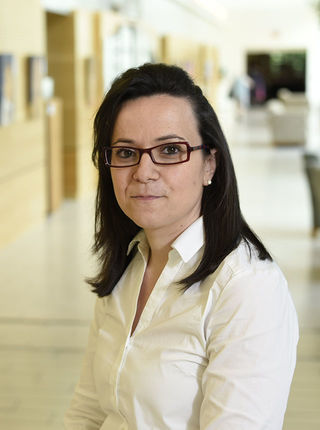Lucia Borriello, PhD
Assistant Professor, Cancer and Cellular Biology

- Contact Information
-
- About Me
-
Research Interests
- Breast Cancer
- Lung Cancer
- Cancer Signaling
- Dormancy
- Metastasis
- Tumor Microenvironment
- Immune Microenvironment
- Intravital Imaging
- Therapeutic Resistance
About
Despite advances in treatment, metastatic cancer remains largely incurable. Metastases can manifest months, years, or even decades after the removal of the primary tumor. This is because disseminated tumor cells (DTCs) that seed distant organs can survive in a non-proliferative state, referred to as “dormant state”. Metastatic growth occurs when tumor cells exit dormancy (a process called “awakening”) and resume proliferation. As such, dormancy and metastatic recurrence are responsible for deaths of cancer patients. Currently, there are no drugs to eradicate dormant tumor cells. This is because their biology is largely unknown.
The goal of the Borriello Laboratory is lab to understand how the tumor microenvironment regulates the mechanisms of dormancy and awakening of tumor cells in order to identify new therapies targeting dormant tumor cells and preventing metastatic disease. To this end, we use a multidisciplinary approach spanning multiplex immunofluorescence, organotypic culture, multiphoton intravital imaging, and in vivo models with the mission of developing novel therapeutic strategies to eradicate dormant tumor cells and combat mortality from metastasis
Currently, our lab focuses on two major questions in breast and lung cancer:
1. How do tumor cells enter dormancy in the primary tumor?
Patient data and mouse models of different cancer types demonstrate that tumor cell dissemination occurs even before primary tumor is clinically detectable, and these early disseminated tumor cells (DTCs) are dormant and contribute to metastasis. These data suggest that the dormancy program initiates in the primary tumor and is carried over by DTCs in distant organs. However, it is unclear how the primary tumor instructs tumor cells to enter dormancy. We recently demonstrated that particular microenvironmental niches, rich in macrophages, in the primary tumor educate tumor cells for dormancy (Borriello et al., Nature Communications 2022).
2. How do tumor cells exit dormancy at metastatic sites?
Tumor cells disseminate from the primary tumor and seed in distant organs, remaining dormant for many years. Upon unknown microenvironmental signals, DTCs exit dormancy and start to proliferate, leading to metastasis formation. However, the mechanisms and signaling that trigger DTCs to exit dormancy are poorly understood. The role of stromal cells in cancer progression and metastasis has been extensively demonstrated, but their contribution to the awakening of dormant DTCs has not been determined.
Our goal is to determine if fibroblast-derived soluble factors and extracellular vesicles induce DTCs to exit dormancy. The results of this project will identify new microenvironmental factors and signaling pathways that regulate awakening of dormant DTCs, and will provide new targets for therapeutic strategies to eliminate dormant cancer cells or to keep them in a perpetual dormant state.
Additional information about our research program can be found on our website: www.borriellolab.com
- Education, Training & Credentials
-
Educational Background
- Postdoc, Anatomy and Structural Biology, Albert Einstein College of Medicine, Bronx, NY
- Postdoc, Hematology and Oncology, Children’s Hospital Los Angeles & University of Southern California, Los Angeles, CA
- PhD, University of Paris, France
Memberships
- American Association for Cancer Research
- American Society for Cell Biology
- American Association of Immunologists
- Association for Women in Science
- American Society for Bone and Mineral Research
- American Association for the Advancement of Science
- European Association for Cancer Research
- Metastasis Research Society
Honors & Awards
- Gridley McKim-Smith Women’s Health Fellowship Award (2021)
- Ambassador, American Society for Cell Biology (2021-present)
- Early Career Investigator Award, METAvivor Breast Cancer Foundation (2020-21)
- Dennis Shields Postdoctoral Research Prize, Poster Award, Albert Einstein College of Medicine (2019)
- Planning Committee, 17th Metastasis Research Congress, Princeton, NJ (2018)
- Travel Award, 17th Metastasis Research Congress, Princeton, NJ (2018)
- Chair, Early Career Leadership Council, Metastasis Research Society (2017-20)
- Travel Award, 16th Metastasis Research Congress, Chengdu, China (2016)
- Planning Committee, 16th Metastasis Research Congress, Chengdu, China (2016)
- Research Career Development Award, Children’s Hospital Los Angeles, CA (2015-17)
- Planning Committee, 7th NCI-Tumor Microenvironment Junior Investigators Meeting, Bethesda (2016)
- Co-Chair, 6th - NCI-Tumor Microenvironment Junior Investigators Meeting, Los Angeles (2015)
- Planning Committee, 5th NCI-Tumor Microenvironment Junior Investigators Meeting, Bethesda (2014)
- Ambassador, Early Career Leadership Council, Metastasis Research Society (2014-17)
- Ambassador, European Association for Cancer Research (2013-present)
- European Union “Leonardo Da Vinci” Scholarship, Sapienza University of Rome, Italy (2009)
- Research Scholarship, Queens University Belfast, Ireland (2008)
- Publications
-
Digital Bibliography
- Related Links
